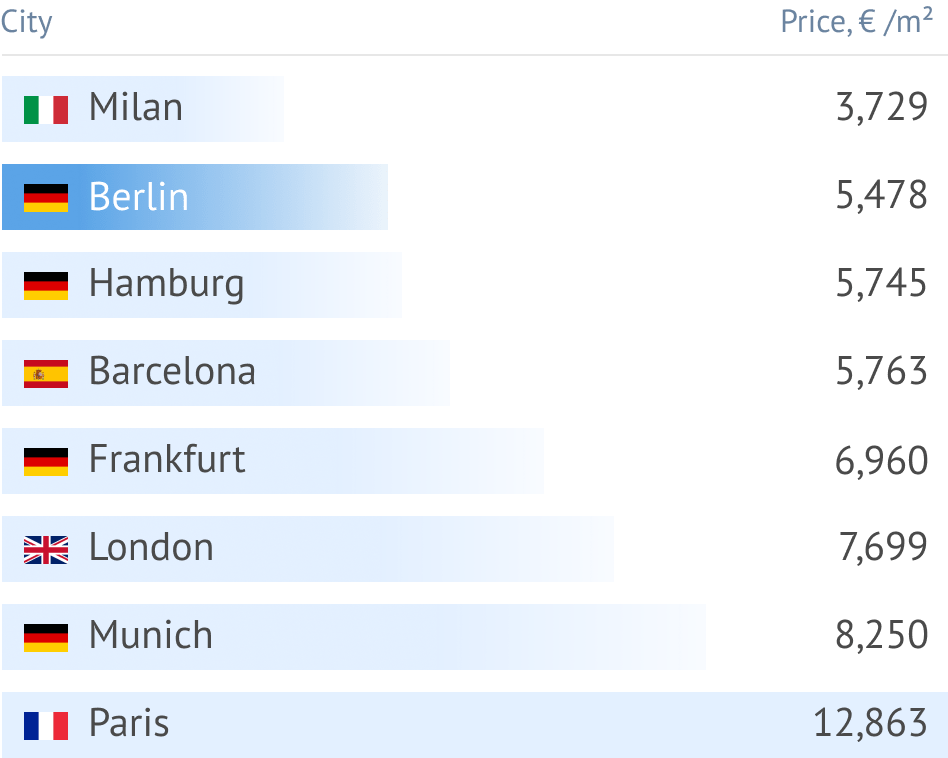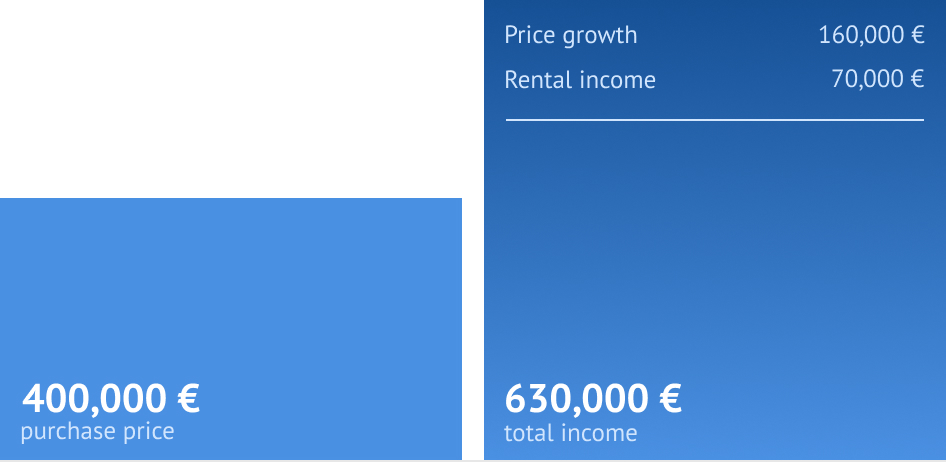Real estate investments in Berlin
Why Germany has proven so attractive among international investors, and has inspired property buyers to conclude time and again that Berlin trumps London, Munich and Paris:
- Affordable prices
- Robust market
- High liquidity
- High rental demand

Meter for meter, Berlin real estate is more affordable than real estate in Europe’s other major cities
In 2020, Deloitte released findings that meter for meter, property in Berlin is considerably less pricey than what can be found in other major German cities, such as Munich and Frankfurt, as well as in other European metropolises, like Paris and London.
-
400,000€
average apartment price in Berlin
-
250,000€
average microapartment price in Berlin
Germany boasts highest GDP in Europe
In 2020, Germany had the highest GDP in Europe. Germany’s economy has been consistently among the strongest in Europe. This practically guarantees the enduring strength of the real estate market.
Berlin forecasted to be top destination in 2021
According to a study conducted by PwC, real estate investors preferred Germany to all other European markets in 2020. Berlin was found to be the top‑ranking location for ”overall real estate prospects.” The strong economy, combined with limited office, residential, and storage spaces, instilled confidence in investors that such properties would continue to earn solid yields, even amid the pandemic.

Index of investment potential of cities. Source: А joint survey by PwC and the Urban Land Institute
Berlin’s population is growing, while space remains limited
Every year, students and professionals flock to Berlin. Based on Tranio’s experience, each time a newly vacant apartment appears on the market, upwards of 20 to 30 prospective renters tend to request viewings, and typically about half of these tend to formally apply to move in. In other words, demand for residential space is enormous.

Berlin population growth in mln people. Source: Amt für Statistik Berlin-Brandenburg
Favorable regulations boost yield prospects for new developments
- Whereas pre-owned properties are subject to specific rental rate policies, new developments can be rented out for any sum.
- Banks are less reluctant to provide mortgage loans for new developments as compared with pre-owned housing; as a result, leverage can strengthen earning capacity.
- Because of Berlin’s housing shortage, apartments are readily re-sold at higher prices, and apartments in beautiful, modern buildings are in buoyant demand.
-
40%
of the city’s housing units were built before World War II
-
55%
housing was built between World War II and 2010

Berlin apartments by construction year. Source: Amt für Statistik Berlin-Brandenburg
Rental rates by districts in Berlin
Berlin apartments can earn up to 58% of their price in five years
According to Guthmann’s data on rental and sale price dynamics among Berlin apartments in 2010 through 2020.
-
2.5–4.5%
per annum of rental yield
-
5–10%
increase in price per sq. m each year
Getting a mortgage loan in Germany
Foreigners may apply for a mortgage loan amounting to 50–70% of the property value at 1.5–2% per annum.
If an applicant seeks a mortgage at a bank where the applicant already has had an active account in recent years, an approval will take less time as the bank will be able to quickly assess the applicant’s capacity to pay back the loan.
-
50–70%
property value lent as mortgage loan
-
1.5–2%
mortgage rate at a German bank
-
65 years
maximum permissible age of the applicant by the end of the loan term
-
20 years
average mortgage loan term
New residential complexes in Berlin
Total 193 apartmentsfrom 449,500 €
Residential complex with 14 houses in BerlinThe residential complex is to be commissioned in Q1 2021.
from 265,000 €
New developments in WilmersdorfThe residential complex is to be commissioned in Q3 2020.
from 182,000 €
Residential complex in LichtenbergThe residential complex is to be commissioned in Q3 2022.
from 379,000 €
Residential complex in FriedrichshainThe residential complex is to be commissioned in 2022.
Popular investor questions
-
How to evict a tenant from a tenant apartment that you purchased?
The owner may evict the tenant if the apartment is required for the owner as a place of residence. Another legitimate reason for eviction may arise when the housing is required as a place of residence for the owner’s relatives, such as the owner’s natural and adopted children, nieces and nephews, spouse, parents of both spouses, siblings.
The owner who purchases an apartment in a former commercial apartment building may request eviction of a tenant who used to live in such apartment before legal division of the building into separate apartments upon expiry of at least three years after the purchase.
The tenant that receives an eviction notice may continue to reside in the apartment for some time. The eviction notice period is three months for tenancy shorter than five years, six months for tenancy lasting for five to eight years, and 12 months for tenancy longer than eight years.
Socially vulnerable tenants, such as seniors, disabled, pregnant women, tenants with small children, are entitled to deferrals and thus subject to longer eviction notice terms.
-
How to rent out a residential apartment for a short term?
Renting out a residential apartment for a short term is extremely challenging. The owner has to obtain a permit from the city authorities; however, the city authorities often issue permit refusals, especially if the apartment is located in a district with lots of hotels.
Grounds for short-term rent:
- The landlord is acting in the public interest. For example, he rents to relatives of patients in Berlin clinics from other cities.
- The landlord is in financial distress, and short-term rent income is the only way to creep out of the dire state.
- The landlord is building another housing for long-term rent.
If short-term rent is approved, a compensation fee of 6 € per sq.m is to be paid to the city authorities. The permit approving the rent may be for an unlimited or a limited term, as the authorities may think fit. Violation of the conditions is punishable with a penalty of up to 500,000 €.
-
How the new law freezing rent prices in Berlin works?
The new law caps and freezes rent increases for five years. The law applies to the rent rate and not the utilities. The rent rate may be increased in a renovated housing by no more than 1 € per sq.m even if the renovation costs are higher.
The new rent law came into effect on 23 February 2020. New developments built after 1 January 2014, commercial rents, communal housing, and state-subsidised apartments are not subject to the law. However, the law regulates furnished apartments and short-term rental apartments.
-
What increase in rent is allowed?
According to the German Civil Code, rent may be increased by no more than 20% during the three years. Rent increase is capped at 15% during three years in Berlin, Munich, and Hamburg. Rent may be increased no more than once in a period of 12 months.
-
Is a buyer of property in Germany eligible for a residence permit?
Purchase of property in Germany does not confer any grounds to obtain a residence permit.
-
What additional costs arise in a purchase of property?
The buyer will have to cover the transaction costs that amount to 10–15% of the property price. Such costs include the real estate purchase tax at 3.5–6.5%, notary’s fee of 1–1.5%, legal fee of 1–1.5%, agent’s fee of 3–6% + VAT and a regional registration fee of 0.8–1.2%.
-
Is it safe to buy an under-construction apartment?
The investor in Germany is protected by law. If the developer fails to complete construction, the payments made shall be returned in full. The buyer makes payment by installments.
-
Can a property be bought without visiting Germany?
Only two procedures require personal presence — bank account opening and legal entity registration (if applicable). A notary may be granted a power of attorney to represent the buyer at all the other purchase stages.
How we help investors
We analyse the needs
We have a methodology that enables us to find the best offers.
We do the tax structuring
We are well versed in the market and local laws We develop customised tax solutions.
We support the transaction
We assist the investor from the moment of property selection to closing We give advice at all stages of the process.
We help with obtaining a mortgage loan
We engage trusted lawyers and mortgage brokers We give advice and help collect required documents.
We arrange viewings
You will see a completed or pending property, and if interested, you will learn about the developer’s other projects.
We save you time
If the investor cannot attend the transaction proceedings in person, we can arrange a remote acquisition, thereby reducing the number of visits to the country to the minimum.

































